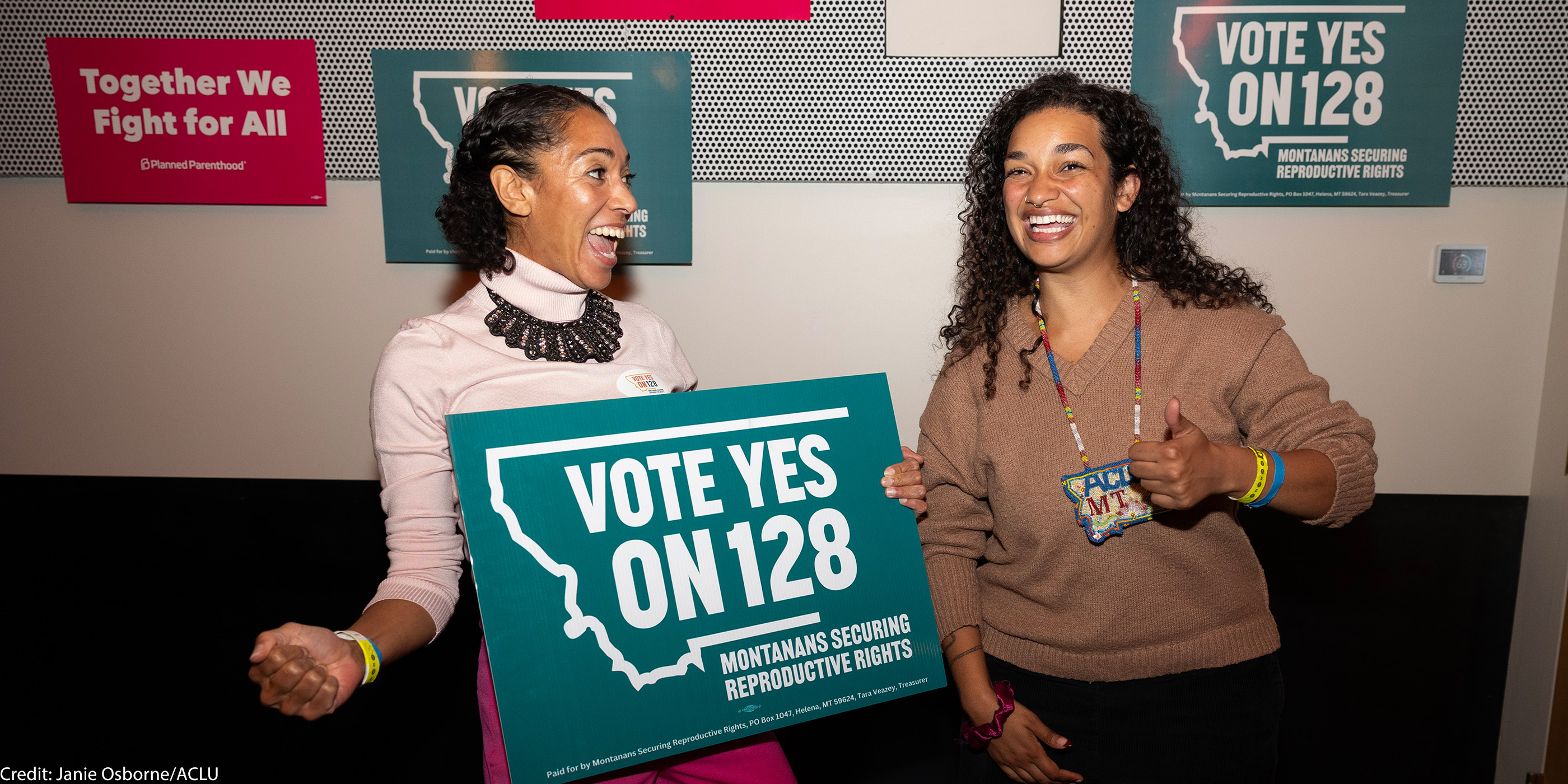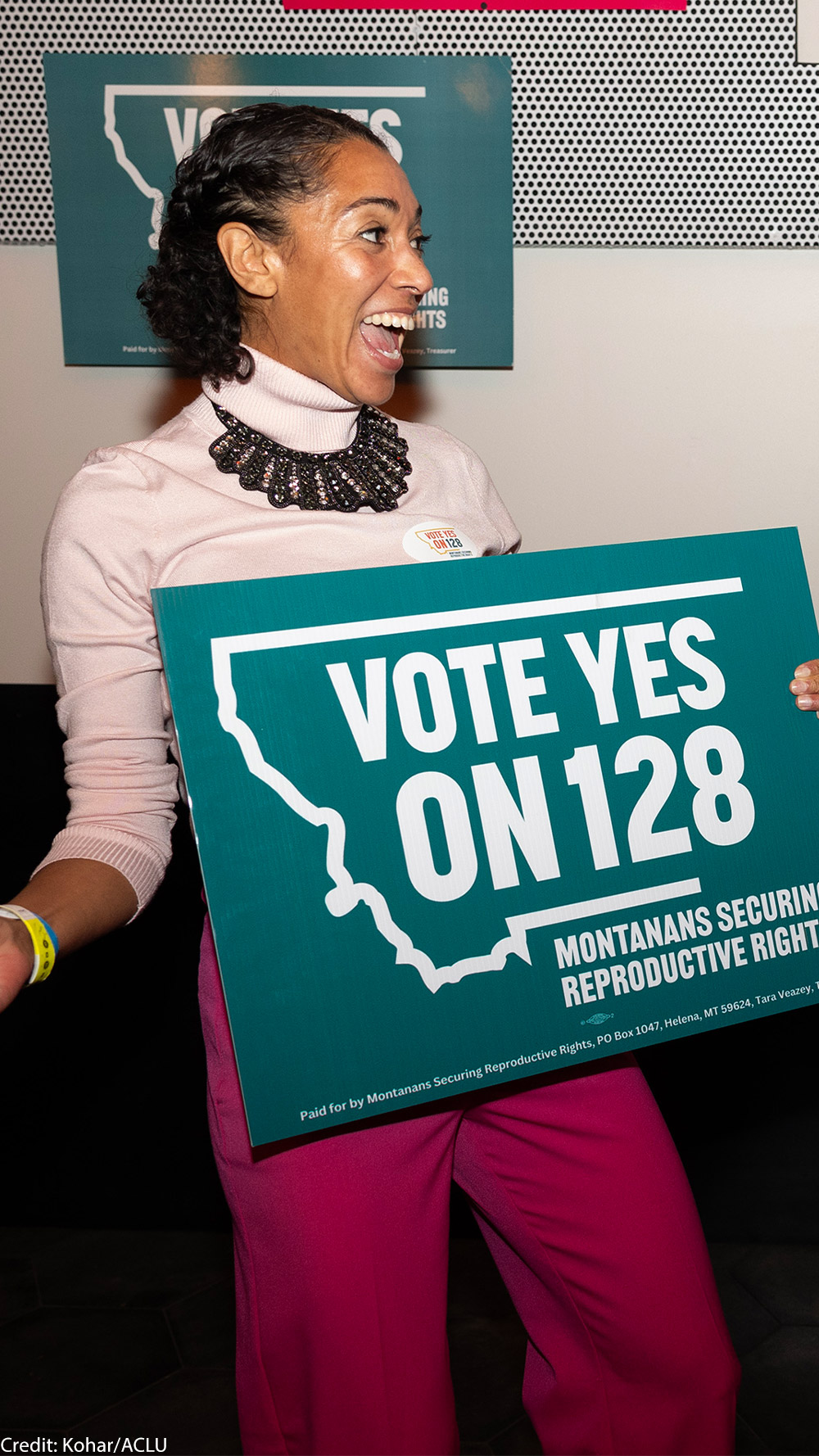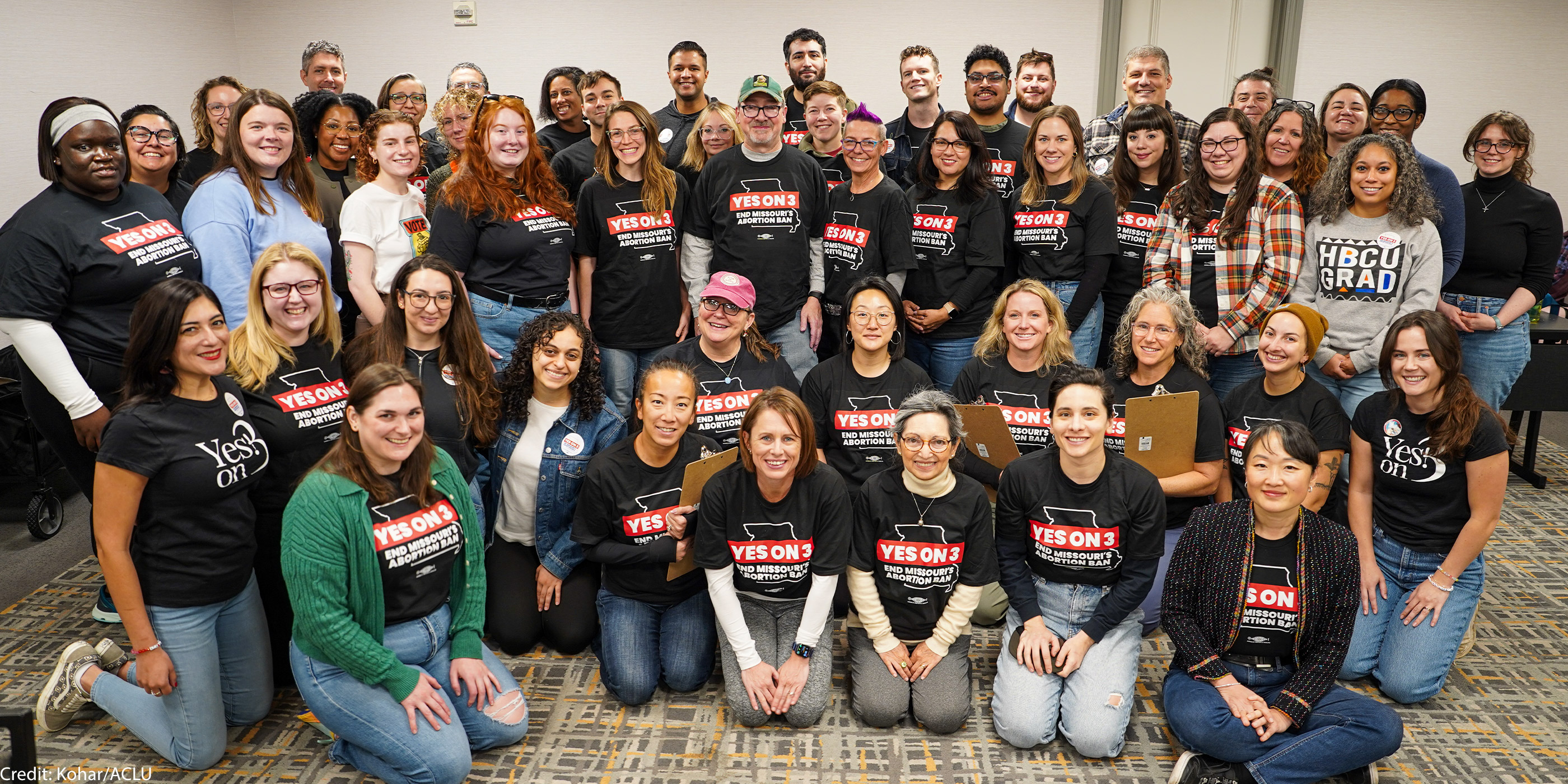In Trump Country, Ballot Measures Safeguard Abortion Rights


In the final weeks of the election, Vice President Kamala Harris and the Democratic Party focused their campaign efforts on abortion rights, particularly in key swing states. While those efforts did not secure Harris a win, in the 10 states where abortion rights were on the ballot, seven voted to safeguard abortion rights in their state constitutions.
Among those seven states, in Arizona, Missouri, Nevada and Montana — where President-elect Donald Trump won — abortion ballot measures definitively passed. In many cases, the ballot measures were more popular than Trump. While these red state wins indicate just how popular abortion rights are among even conservative-leaning voters, wins in blue and purple states, including Maryland, Colorado and New York, show that reproductive freedom continues to be an issue that defies party lines.
Abortion Rights Win in Trump Country

Kohar/ACLU
Thirteen states currently have total abortion bans in effect, but Missouri was the first state to enforce its ban, taking action mere minutes after the fall of Roe v. Wade. Missourians, who voted for Trump in 2016, 2020 and in 2024, this year passed Amendment 3 to end the state's total abortion ban, which was one of the strictest in the country. Amendment 3 ensures that decisions about Missourians’ reproductive health care — including abortion, birth control, and miscarriage care — can be made by patients with their health care providers, not politicians.
The ACLU, ACLU of Missouri and its partners led this ballot measure and, the day after it passed, we again joined with partners to file a lawsuit on behalf of Planned Parenthood to implement the amendment and urgently restore access to care in the state. Krysten Vaughn, the community engagement associate at the ACLU of Missouri, saw firsthand just how popular abortion rights are in her red state. While canvassing for Amendment 3, she spoke to a mother who was thrilled that she and her husband could vote for Amendment 3 to protect their family.
She also knocked on the door of an elderly man who said his wife had waited an hour in line to vote yes on the amendment. “He was very enthusiastic and even said ‘bless you all for the work you’ve been doing,’” Vaughn said.
Like Missouri, Montana voters have supported Trump in the past three elections. Montana’s Supreme Court, however, has a strong precedent protecting abortion rights. As we saw with the U.S. Supreme Court’s decision in Roe, court opinions can change if the court’s makeup changes. That’s why, this election cycle, voters chose to safeguard an explicit right to abortion in their constitution and passed Constitutional Initiative 128 by more than 15 points. This initiative permanently secures the right to make and carry out decisions about pregnancy and abortion in the state constitution. The ACLU of Montana was a driving force behind the ballot measure, uplifting the overwhelming support for abortion rights in deep Trump country.
Khadija Davis, a political strategist with the ACLU of Montana, spoke to Montanans about why this ballot measure was personal. Davis saw people drive hundreds of miles, endure tough weather, spend long hours volunteering, and make phone calls to mobilize their communities to vote for their reproductive rights. While phone banking, Davis met women who shared their experiences from decades ago, before Roe, who said they refused to go back – they were voting for a better future for their children.
“You could feel the passion and compassion people had for one another, and this campaign,” Davis said. “When I was at the rally in Helena, people were crying, hugging, and sharing joy. They made signs, dressed in matching shirts, and came out to build community around hope.
The ACLU and the ACLU of Montana not only supported the ballot measure, we also invested in Montana’s Supreme Court race to educate voters on candidate positions on civil liberties and rights. As a result, the pro-civil liberty majority was preserved on the state Supreme Court. The state Supreme Court will now determine how the ballot measure is implemented and the ACLU will work to hold it accountable for enforcing this vital protection.
Red State Near Misses and Purple State Wins Show Power of Abortion at the Polls
In the Southwest, Arizona has also aggressively restricted abortion access for decades, imposing a 15-week ban on abortion after Roe was overturned and almost reinstating an 1864 total abortion ban. Given the opportunity to change this, a majority of voters — almost 62 percent — voted yes on Proposition 139, which enshrined the right to abortion in the state’s constitution. With more than half the vote, the ballot measure passed with a wider margin than Trump’s win.
Harrison Redmond, a community organizer at the ACLU or Arizona, was proud to have the opportunity to work on this ballot measure so that all Arizonans, including his younger sister, can live in a state that respects their civil rights and liberties. Redmond spoke with countless volunteers and supporters over the last year who wanted the same thing as him: equal rights for the people in their lives who can become pregnant.
“Arizonans made it clear that they don’t want the government interfering with important, personal health care decisions about abortion. Passing Prop. 139 is a huge step that will ensure people in our community get the care they need,” Redmond said.
In the East, while the abortion ballot measure didn’t win in Florida, it came close with 57 percent of voters supporting Amendment 4, which would have prohibited laws restricting abortion before fetal viability or when necessary to protect a pregnant person’s health. Unfortunately, the state’s undemocratic 60 percent threshold for passing a ballot initiative kept this vital right from being restored. That barrier, combined with deceptive tactics from Gov. Ron DeSantis, including a state-run, taxpayer-funded campaign to deceive voters as well as threats to petition signers and TV stations, proved too much to overcome.
Blue States Lead on Securing Abortion Rights in the Absence of Federal Protections
Trump lost some blue states, like Massachusetts, by much smaller margins than he did in 2016 or 2020, indicating a shift in voter preferences in so-called Democratic strongholds. Despite these shifts, two blue states, New York and Maryland, voted to enshrine abortion rights into state law.
In New York, the Equal Rights Amendment, or Prop 1, passed with 62 percent of the vote. The amendment protects against unequal treatment based on ethnicity, national origin, age, disability, and sex, including sexual orientation, gender identity, pregnancy, and reproductive healthcare and autonomy.
In Maryland, 75 percent of voters said yes to Question 1, which confirms an individual’s fundamental right to reproductive freedom. While both Maryland and New York already had abortion rights’ protections in state statute, Prop 1 and Question 1 add another layer of more durable protections.
Across the Country, the Fight Continues
The ACLU is building a firewall for freedom to help state and local governments protect our rights always, especially in the face of federal abuses. Our reproductive freedom firewall work includes continuing to work with local partners on abortion rights ballot measures since the fall of Roe v. Wade. But we know passing these ballot initiatives are just the first step.
In 2022, the ACLU was a driving force behind the successful abortion rights measure in Michigan. As a next step, just as we have in Montana, we wanted to make sure that the will of the people was effectively carried out through judicial interpretation of the measure, which often falls to the highest court in the state. To bolster that abortion rights victory, in 2024, the ACLU Voter Education Fund spent $2 million on voter education around Michigan’s Supreme Court candidates to help educate voters on the role of the court on this issue.
While we are very encouraged by the successes we’ve seen, passing ballot measures to ensure reproductive rights is not a holistic solution. Only half of the states even allow citizen-initiated ballot measures. And, across the country, one in three women of reproductive age currently live in states where abortion is banned. We need a nationwide solution to this public health crisis, including federal-level protections for abortion and reproductive health care.
The voters have spoken loud and clear. Across the country, Americans do not want to see abortion banned. At the ACLU we’re ready to fight to protect the will of the people. Already, we’ve vowed to block any attempts by the upcoming Trump administration to weaponize the Comstock Act to effectively ban abortion nationwide or to take medication abortion off the market. And we won’t stop there. Any attempt to restrict our reproductive freedom will be met with the full force of the ACLU.

